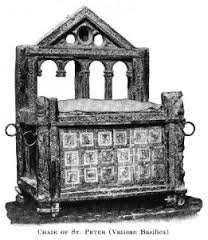Arguably the two most influential Christian apologists of the twentieth century were G.K. Chesterton and C.S. Lewis. Both were accomplished essayists, novelists, poets, and converts from atheism. Chesterton’s conversion came first, and by the admission of Lewis it was Chesterton’s great tome The Everlasting Man that influenced his own conversion. Chesterton became a Catholic, Lewis an Anglican. But that is not the reason I rank Chesterton over Lewis. I do not mean to slight Lewis when I say that Chesterton was more eloquent in style and deeper in thought. My own return to the Catholic faith I had abandoned in the middle years of my life was largely influenced by the profound beauty and depth of Chesterton’s Everlasting Man. I cannot think of a single book by Lewis that would have had a comparable effect on me, not even Mere Christianity, another heroic effort to open up the minds and hearts of many who have resisted being won over to Jesus Christ.
That said, before taking a look at three books by Lewis, let us start this tribute to him by noting several literary sparklers that I hope will entice readers to mine some gems of their own. On the nature of faith, Lewis said: “I believe in Christianity as I believe that the sun has risen: not only because I see it, but because by it I see everything else.” On sex: “Our warped natures, the devils who tempt us, and all the contemporary propaganda for lust, combine to make us feel that the desires we are resisting are so ‘natural’, so ‘healthy,’ and so reasonable, that it is almost perverse and abnormal to resist them.” On education: “Education without values, as useful as it is, seems rather to make man a more clever devil.” On immortality: “If I find in myself a desire which no experience in this world can satisfy, the most probable explanation is that I was made for another world.”
“The devil, the proud spirit, cannot endure to be mocked,” said St. Thomas More. In The Screwtape Letters (1942), a little book of imaginary letters from a senior devil named Screwtape to his nephew Wormwood whom he is teaching the craft of temptation, Lewis puts us inside the mind of the devil to explain how he works his malicious will upon us. Lewis’s many mocking jabs at the proud spirit are memorable. In one letter Screwtape instructs Wormwood on the absolute importance of whispering into the ears of Christians that the teachings of their founder began to be corrupted soon after his death. Christians must be continually tempted to reassess the importance of Jesus every thirty years to keep pace with the changing times. One effective technique will be to focus on the things that Jesus said, rather than the things that he did (note that Jesus is demoted from savior to teacher).
Even with respect to what Jesus said, humans must be distracted from seeing that Jesus agrees sometimes in substance with the wisdom of a Socrates or a Confucius. If they get wind of such agreement, they may begin to suspect that God has through the ages been sending the truth to men by many emissaries, and that Jesus is the last and crowning achievement of all wisdom. Screwtape grudgingly allows that Jesus is to be praised as a man, as any other man is praised, but never to the point of acknowledging his divinity. Such a notion defies human reason, and, despite plentiful evidence to the contrary, modern man prides himself on being, above all else, eminently reasonable. Once Jesus is thoroughly humanized and rationalized, he becomes a mere historical figure who can have no more influence than any other hero of history … which is to say very little. Thus in just one of Screwtape’s letters Lewis points out how cleverly the devil’s strategy has already worked out so well in the modern world.
Next to Mere Christianity, my own favorite book of apologetics by Lewis is God in the Dock (a posthumously assembled collection of some of his best essays). In the chapter titled “Is Theism Important” Lewis talks about the so-called proofs for the existence of God. Yes, Lewis argues, it is valid to entertain such proofs, but they are not alone what help us to believe, so much as to clear away certain intellectual objections that we may have constructed to prevent belief. Rather, faith is a condition of trust in the unseen and unproven power of an all-powerful God. Echoing St. Augustine, Lewis insists this faith cannot be obtained without the intellectual and spiritual assent of the believer. So long as the believer says No, No, No, so long as a wall has been erected and there is a refusal to tear it down, you cannot know God. The sincere seeker of the truth begins by asking himself, “Why is there a wall between God and me?”
In the chapter titled “The Decline of Religion” Lewis concedes that religion indeed is in decline and has been for centuries; certainly the nineteenth century was the tipping point when, thanks to Charles Darwin, it became a matter of going for the jugular between scientists and theologians. Though Lewis knew the decline of religion was in general bad for the world in the consequences that must follow, he believed this decline was not only inevitable, but perhaps a good thing for religion over the long haul. The religion that was in decline was probably not the best kind of religion anyway, but more a lazy and perfunctory religion that had lost its medieval sincerity and power. Sooner or later the real battle between Christianity and its enemies must be joined, Lewis opined, and he believed the champions for Christianity would not be the philosophers and the apologists, but rather the “Preacher in the full sense, the Evangelist, the man on fire, the man who infects. The propagandist, the apologist, only represents John the Baptist: the Preacher represents the Lord Himself. He will be sent, or else he will not. But unless he comes we mere Christian intellectuals will not effect very much.”
In the chapter titled “Answers to Questions on Christianity,” Lewis fields a question on how it is possible to be a Christian and go to war. His reply is that the ones who sin by trying to murder us must be stopped dead in their tracks if that is the only way to stop them. In reply to the question of whether there will ever be a chance of world-wide reunion of Christians of every stripe, Lewis answers that conservative Christians of every denomination have more in common and a better chance of re-union than the broad-minded liberals because the latter’s watered down religion “is a world where a small number of people say totally different things and change their minds every few minutes.” Such free spirits will never unite with the traditionalists and can barely unite with each other. When asked if he believed in the devil, Lewis replied that he certainly did, but that he didn’t think such belief was required for salvation. It seemed to him that the devil was not likely to make his presence known to those who were inclined to sin, but that those who were not inclined to sin were more likely to feel conscious of the need to wear protective armor against any spiritual Nazi, especially the Devil.
In the chapter titled “Religion and Science,” Lewis keys in on the expectations of how nature will behave according to the laws of nature. The scientist will tell us they cannot be altered. But Lewis objects on the grounds that the scientist is limited by his knowledge of nature along with his ignorance of the supernatural. The scientist cannot know if a supernatural power is at work in nature and able to tweak its behavior from time to time. Ah, but the scientist complains, there is no scientific proof of a supernatural Power. Indeed, all the evidence seems to go the other way given the vastness of the universe. Why would a so-called supernatural Power bother itself with our puny grain of earth in the vast sea of universal space? But this is a diversionary tactic, Lewis insists. The vastness of the universe was always known by the ancients, and they never regarded that vastness as an argument against the importance of Earth and its inhabitants. It is only the modern atheists who have tried to hush up talk about God by having us believe that if anything is really infinite it is the universe, not God. So what need have we of God? Lewis ends by asking the obligatory question: “Don’t you think that all you atheists are strangely unsuspecting people?” For those living in the age of the Big Bang theory, which posits the existence of a finite universe, this is indeed the most logical question to ask.
Mere Christianity (1943) is surely Lewis’s most popular book of apologetics. Based originally on a series of radio broadcasts, Lewis’s goal in writing the book was explained in the preface: “Ever since I became a Christian I have thought that the best, perhaps the only, service I could do for my unbelieving neighbors was to explain and defend the belief that has been common to nearly all Christians at all times.” Thus “Mere Christianity” (a phrase originally coined by Chesterton) does not trivialize Christianity, but rather points to the fundamentals which are much fewer and unite, rather than the full and complex range of theological disputes that tend to divide Christians against each other.
As to the “hidden God” that so many Christians and atheists complain of, there may be no better explanation to be found than in this passage from Mere Christianity: “If there was a controlling power outside the universe, it could not show itself to us as one of the facts inside the universe—no more than the architect of a house could actually be a wall or staircase or fireplace in that house. The only way in which we could expect it to show itself would be inside ourselves as an influence or a command trying to get us to behave in a certain way. And that is just what we do find inside ourselves.”
So, following Augustine, we must have faith in the unseen in order to see. But faith requires training or it is useless. “Now that I am a Christian I do have moods in which the whole thing looks very improbable: but when I was an atheist I had moods in which Christianity looked terribly probable. This rebellion of your moods against your real self is going to come anyway. That is why Faith is such a necessary virtue: unless you tell your moods ‘where to get off’ you can never be either a sound Christian or even a sound atheist, but just a creature dithering to and fro, with its beliefs really dependent on the weather and the state of digestion. Consequently, one must train the habit of faith.”
Hence the importance of a religious routine in one’s life of prayer and church attendance. Without cultivating these two habits especially, the likelihood that one can be talked out of one’s religion is negligible compared to the likelihood of simply drifting away on one’s calm sea of passivity. The Christian must be muscular about his religion, even as the muscular Carpenter was when he bore his heavy cross to Calvary, or he is kidding himself that he is a Christian. Christianity is a religion of work, and Scripture promises us two things about that work. It is both our work and God’s, as we learn from the apostle Paul. “The first half is, ‘Work out your own salvation with fear and trembling’ – which looks as if everything depended on us and our good actions: but the second half goes on, ‘For it is God who worketh in you’ – which looks as if God did everything and we did nothing.” This is not a contradiction, but only the two sides of the same coin by which we purchase salvation.
In the chapter titled “Morality and Psychoanalysis” Lewis admits that when Freud is talking about the psychology of choices, he is often on target, but when he is talking about the morality of choices, he can be quite off target because he was not really so much a student of philosophy as a student of psychology. What Freud did was to ignore moral problems in favor of psychological solutions. While Freud could see abnormality everywhere, his objective was to reduce the abnormal to the normal. Indeed, I am not aware that Lewis knew it, but Freud did seek to normalize same-sex attraction, and it was perhaps at least partially a legacy of his that the professional psychologists of America eventually would, several decades after him, officially declassify homosexuality as a psychological abnormality. But for Lewis moral choices always trump psychological abnormalities. “Good people know about both good and evil: bad people do not know about either.” It may well be that very good people are abnormal, but very bad people are abnormal with a vengeance.
In the chapter titled “Sexual Morality” Lewis castigates those who argue that at last the modern world has learned to relax about sex and treat it as entirely normal and healthy. In point of fact, it has done no such thing. It has learned to treat sex as an obsessive indulgence far more dangerous in the long haul than excessive eating or drinking. “They tell you sex has become a mess because it was hushed up. But for the last twenty years it has not been hushed up. It has been chattered about all day long. Yet it is still a mess. If hushing it up had been the cause of the trouble, ventilation would have set it right. But it has not. I think it is the other way around. I think the human race originally hushed it up because it had become such a mess…. Surrender to all our desires obviously leads to impotence, disease, jealousies, lies, concealment, and everything that is the reverse of health, good humor, and frankness.”
In the chapter titled “The Great Sin,” Lewis tackles the one vice that feeds all other vices: Pride. Lewis regards the main focus of Christian morality as the war between pride and humility, and he sees nowhere in the world more stress on the sin of pride than in the Christian religion. “I do not think I have ever heard anyone who is not a Christian accuse himself of this vice. And at the same time I have very seldom met anyone, who was not a Christian, who showed the slightest mercy to it in others…. Pride leads to every other vice: it is the complete anti-God state of mind.”
Pride is in its essence competitive, unlike the other sins. It exults in a man proving that he is King of the Mountain. “The sexual impulse may drive two men into competition if they both want the same girl. But that is only by accident; they might just as likely have wanted two different girls. But a proud man will take your girl from you, not because he wants her, but just to prove that he is better than you.” Again: “What makes a pretty girl spread misery wherever she goes by collecting admirers? Certainly not her sexual instinct: that kind of girl is often sexually frigid. It is Pride. What is it that makes a political leader or a whole nation go on and on, demanding more and more? Pride again…. If I am a proud man, then as long as there is one man in the whole world more powerful or richer, or cleverer than I, he is my rival and my enemy.”
Lewis sees in Pride the root cause of atheism. “In God you come up against something which is in every respect immeasurably superior to yourself. Unless you know God as that, and therefore know yourself as nothing in comparison, you do not know God at all. As long as you are proud you cannot know God, A proud man is always looking down on things and people: and, of course, as long as you are looking down, you cannot see something that is above you.”
But even the self-professed Christian can share in the atheist’s tragic flaw. “How is it that people who are quite obviously eaten up with Pride can say they believe in God and appear to themselves very religious? I’m afraid that means they are worshipping an imaginary God. They theoretically admit themselves to be nothing in the presence of this phantom God, but are really all the time imagining how He approves of them and thinks them far better than ordinary people: that is, they pay a pennyworth of imaginary humility to Him and get out of it a pound’s worth of Pride toward their fellow-men.”
But Lewis does not leave us without a solution to the dilemmas attendant upon Pride. The cure for Pride is abundantly clear: abundant humility. “If anyone would like to acquire humility, I can, I think, tell him the first step. The first step is to realize that one is proud. And a biggish step, too. At least nothing can be done before it. If you think you are not conceited, it means you are very conceited indeed.”
And now we come to the chapter titled “We Have Cause to Be Uneasy,” Lewis talks about modern man’s sense that he is wrong and refuses to admit it. At some definite point on the road of “progress” he took the wrong turn. Instead of moving closer to his desired goal he has moved farther away from it. We have to judge whether there is Somebody behind the universe, and whether that Somebody is good or terrible, because the ultimate forces of good and evil are too obvious to deny. If there is Somebody behind the moral law, is that Somebody sympathetic to or indifferent to the fate of men? If the Somebody is sympathetic, all our wrongs can be forgiven; if not, we are doomed.
“God is the only comfort. He is also the supreme terror: the thing we most need and the thing we most want to hide from. He is our only possible ally, and we have made ourselves His enemies. Some people talk as if meeting the gaze of absolute goodness would be fun. They need to think again. They are still only playing with religion. Goodness is either the great safety or the great danger – according to the way you react to it. And we have reacted the wrong way.”
Modern man has reacted with impunity as if there is no Somebody behind everything. That way lies not only danger, but madness. “It is after you have realized that there is a real Moral Law, and a Power behind the law, and that you have broken the law and put yourself in the wrong with that Power … that Christianity begins to talk.” Finally, Lewis sees and explains more lucidly than most apologists how Christianity knows the best way to put us right with that Power.
Lewis doubtless believed that Christianity is a fighting religion in the sense that the apostle Paul called for it to be a fighting religion with the sword of the spirit, the shield of faith, and the helmet of salvation. Lewis thought he had found his true castle to defend in the Anglican Church. The irony is that today his thought is less popular among liberal Anglicans and more at home in the minds and hearts of conservative evangelical Protestants and Catholics. The summing up of C.S. Lewis’s present and future legacy is best found in the words of his literary executor, Walter Hooper: “I can say with absolute confidence that more and more Catholics are buying his books now because most of the translations I’ve seen in recent years … have come from Catholic countries. In many instances it is Catholic publishers who are translating Lewis, as in Italy. The same is true in Spain where the translations are the work of Opus Dei – so we know that Catholics are reading them in vast numbers throughout the world.”
(Carl Sundell is Emeritus Professor of English and Humanities at Quinsigamond Community College in Worcester, Massachusetts. He is the author of several books including The Intellectual and the Gunman, Four Presidents, Shaw versus Chesterton, The Dilemmas of Atheism, and has published several articles in New Oxford Review and Catholic Insight. He currently resides in Lubbock, Texas.)












